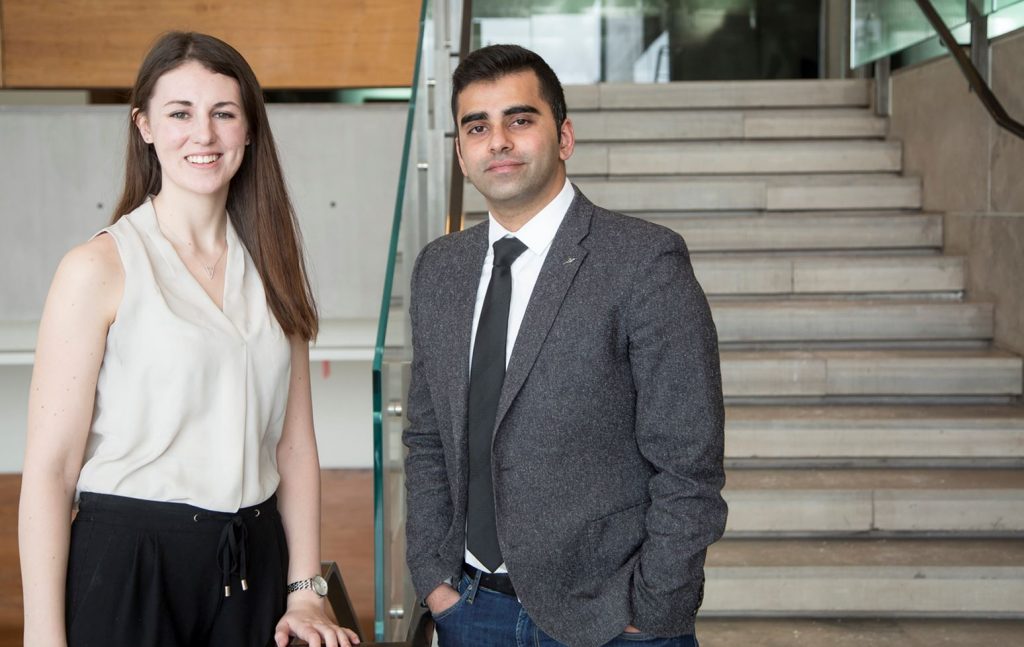Toronto News: Ivey Students Come to the UN, and More

Let’s visit some of the biggest news coming out of Toronto business schools this week.
François Neville Unpacks Why Some Minority Groups Won’t Seek Business Loans – DeGroote Communications Department
François Neville, Assistant Professor of Strategic Management at the DeGroote School of Business at McMaster University, recently investigated whether certain minority entrepreneurs become discouraged when it comes to entrepreneurial activities such as seeking capital. Neville’s has published a study in the Journal of Management Studies breaks down how years of mistreatment have led to many minority business owners not wanting to begin the process of seeking a loan.
“There is a fairly established body of research offering compelling evidence that minorities are subject to inequality in the workplace and entrepreneurship, despite numerous policy initiatives to curb this,” Neville told the school.
You can read more about Neville and the study here.
Ivey Students Participating in UN Conference – News@Ivey
Two Ivey Business School students were given the special opportunity to take part in a United Nations (UN) conference earlier this month. Emma Hogeterp, HBA/Huron Global Studies ’19; and Sanket Mehta, MBA ’18 , participating in the 2018 Winter Youth Assembly at the United Nations headquarters in New York City from Feb. 14-16.
“The purpose of the conference is to not only discuss ideas, but also how they can be applicable in your country,” said Mehta. “What works in one country might not work in another because every country has a different set of economic indicators, such as life expectancy, income levels, and population.”

Ivey Business School students Emma Hogeterp and Sanket Mehta / Photo via ivey.uwo.ca
Learn more about the Youth Assembly and the Ivey students attending the summit here.
Student Trading Competition Celebrates its 15th Anniversary at the University of Toronto’s Rotman School of Management – Rotman Media Centre
The Rotman School of Management is hosting the 15th annual Rotman International Trading Competition (RITC) from February 22 to 24 in the Rotman School’s BMO Financial Group Finance Research and Trading Lab. Teams from 52 different universities spanning the globe will participate in various activities including electronic and outcry trading cases, seminars with industry practitioners, and social events with their fellow competitors.
“Given the challenge associated with each competition case, participants build models to apply theory, process information to separate the signal from the noise, quantify uncertainty and manage risks. Teams who combine those skills with good decision making do the best over the weekend.” Prof. Tom McCurdy, the Bonham Chair in Finance and academic director of the lab and the competition, said.
You can read more about RITC here.
The Differences Between a Full-Time MBA in New York City and Toronto – MetroMBA
We stack up the best of the best when it comes to NYC and Toronto MBA programs, and where each city stands out. Not surprisingly, Toronto MBAs are more affordable, and the cost of living in the city is infinitely more reasonable, but NYC programs have more prestige and potential financial reward.
Even for those who do not pay extra for room and board, expenses for U.S. residents studying at many NYC business schools will be higher than their neighbors to the north. According to Numbeo, the cost of living in Toronto is 24 percent less than the cost of living in New York City, and rent is nearly 40 percent less.
However, the value of the individual school tends to favor New York City programs over its Toronto counterparts. NYU Stern is currently the 12th overall on the U.S. News & World Report 2018 ranking, with CBS coming even higher at 9th overall. The ranking comparison remains consistent with The Economist as well, with CBS coming in 9th (again), Stern coming in 14th. The highest ranked Canadian program in The Economist ranking—Ivey Business School—came in 59th.
Check out the rest of our comparison here.
The Differences Between a Full-Time MBA in New York City and Toronto

New York and Toronto are the largest cities in the United States and Canada, respectively. Both are major financial and cultural centers, and home to millions of hard-working students, employees, and businesses.
Both metros are also home to a number of quality business schools, each with their own prestigious full-time MBA programs. How do New York and Toronto compare as cities and as destinations for your full-time MBA studies? Let’s take a deeper dive and see.
Location
The most bustling and populous metro in the United States, New York City is is the capital of the business world. More Fortune 500 companies are headquartered here than in any other city. The Big Apple is not only home to Wall Street and the world’s largest financial institutions, but also media, marketing and advertising companies. New York is an enormous city and, unfortunately, expensive to live in, so it may not be for everyone.
When looking at metros with bustling financial sectors and companies, New York is often is the first to come to mind. But how about it neighbor to the north? Toronto is also considered one of the world’s fast-growing financial hubs. An article on the Huffington Post explains how Toronto has risen into the top 10 of the world’s most important financial centers. According to the Global Financial Centres Index from Z/Yen Group and Qatar Financial Centre, Toronto has surpassed Chicago and Boston to become the second-most important financial center in North America, and eighth in the world.
According to one unidentified New York banker quoted in the Global Financial Centres Index survey, “Toronto seems to get stronger and stronger. A number of our rivals have opened up subsidiaries there.”
New York City Full-Time MBA Programs
- Columbia Business School
- Stern School of Business – New York University
- Gabelli School of Business – Fordham University
- Zicklin School of Business – Baruch College
What stands out about these programs?
A Columbia MBA opens up countless career options and is sure to pay off in the long run. The median starting salaries for Columbia MBAs is $125,000, with 34 percent of full-time MBA of graduates being employed in the financial services industry. Students may assemble their own elective tracks, but the school also provides recommend course tracks for students interested in careers in entrepreneurship, healthcare, marketing, media, real estate, value investing, and social enterprise.
Meanwhile, Stern’s MBA curriculum gives students tons of flexibility, and allows degree seekers to choose one or two MBA specializations, NYU allows up to three specializations from 20 plus options. Stern makes sure that all students enrolled in the full-time program are ready for business school: Stern hosts a mandatory two-week orientation program in August called “Launch” as well as a special “Summer Start” program that allows students the school believes may need additional preparation to earn up to six credits before starting courses with their classmates in September.
Both Gabelli and Zicklin’s full-time programs feature cohort-based structures. Gabelli’s program features a New York immersion experience where, over the course of five days, students are exposed to a number of company visits with corporations like Deutsche Bank, Money.net, and Hewlett Packard. As an alternative to completing a major, Zicklin students may pursue a joint JD/MBA in conjunction with Brooklyn Law School or New York Law School.
Toronto’s Full-Time MBA Programs
- DeGroote School of Business – McMaster University
- Ivey Business School – Western University Canada
- Schulich School of Business – York University
- Ted Rogers School of Management – Ryerson University
What stands out about these programs?
DeGroote’s full-time MBA is a 16-month program ideal for candidates who are early in their career and want to gain advanced business knowledge in order to have more job opportunities. McMaster is one of only four Canadian universities ranked among the top 100 in the world, including by premiere publications like The Financial Times.
Ivey’s full-time program stands out because it can be completed in one year. During the year, students will learn business essentials from Canada’s only case-based MBA program. Students are able to experience real-world business scenarios through more than 300 cases a year, providing them of hands-on experience for how to best handle a variety of business scenarios.
The Sculich School of Business full-time MBA program is non-traditional due to its amorphous teaching format: The organization, pedagogy, and style of classes is determined solely by the most effective way to teach a particular course. This means that while some course instructors make extensive use of case studies, others do not. Other approaches to delivering courses include in-class presentations, role-playing exercises and visiting speakers and business leaders.
Schulich’s program, however, is on the more expensive side when it comes to Toronto metro business schools. The current full cost of the program in 2018-19 is $77,900 CAD for Canada residents, and $99,400 for international residents. While the tuition costs are actually higher than the likes of NYU Stern or the Columbia Business School full-time programs, because of the cost of living in New York City, the price is actually negligible—especially for Canadian residents.
Schulich/NYU/Columbia Full-Time MBA Costs
| York/Schulich | NYU/Stern | Columbia Business School |
|---|---|---|
| $57,000 (Canada Residents) | $69,086 USD | $71,544 USD |
| $77,900 (Full Cost, Canada Resident) | $110,562 (Full Cost, U.S. Resident) | $107,749 (Full Cost, U.S. Resident) |
Ryerson’s full-time MBA stands out thanks to its Management of Technology and Innovation (MBA-MTI) program, which provides graduates with skills in problem-solving, critical thinking, communication and collaboration. Despite it’s technical sounding name, the MBA-MTO is not a technical program. Instead students enrolled in this track graduate with the skills needed to manage within companies that are focused on tech and innovation.
Breaking Down the Numbers
Even for those who do not pay extra for room and board, expenses for U.S. residents studying at many NYC business schools will be higher than their neighbors to the north. According to Numbeo, the cost of living in Toronto is 24 percent less than the cost of living in New York City, and rent is nearly 40 percent less.
However, the value of the individual school tends to favor New York City programs over its Toronto counterparts. NYU Stern is currently the 12th overall on the U.S. News & World Report 2018 ranking, with CBS coming even higher at 9th overall. The ranking comparison remains consistent with The Economist as well, with CBS coming in 9th (again), Stern coming in 14th. The highest ranked Canadian program in The Economist ranking—Ivey Business School—came in 59th.
NYC/Toronto MBA Rankings
| School | Financial Times Ranking (2018) | The Economist Ranking (2017) |
|---|---|---|
| NYU Stern | 23 | 14 |
| Columbia Business School | 7 | 9 |
| Ivey | 90 | 59 |
| Schulich | NR | 69 |
The higher rankings and costs tend to, unsurprisingly, have a high correlation with financial output. MBA graduates from higher-ranked NYC metro schools tend to do better in terms of salary and bonuses. As previously mentioned, CBS Class of 2017 MBA grads pulled in a median annually salary of $125,000. Class of 2017 Schulich grads, in comparison, made an average median salary of around $90,000 USD.
For more information on the best full-time programs, check out our New York City and Toronto metro pages.
McMaster Nobel Laureate Myron Scholes Shares Insight with Students

The DeGroote School of Business at McMaster Unviersity recently hosted Myron Scholes, a McMaster graduate and nobel laureate who has built a career on the unknown.
First Integrated Business and Humanities Class Starts at DeGroote

McMaster University’s DeGroote School of Business has a surprise this year—and it’s all about integration.
The business school has joined two programs—humanities and business—to create a specialized program for students, according to a recent press release for Canada’s “next generation of business leaders.” Faculties from both McMaster’s schools of business and humanities helped create the new program, which the university offers this fall for the first time. Ever. Its name? The Integrated Business and Humanities (IBH).
“IBH will encourage community engagement and sustainable business practices, with a great deal of emphasis placed on responsible leadership and management tactics in a changing global economy,” said Program Director Emad Mohammad. Mohammad teaches accounting and financial management services at DeGroote. His research focuses on financial reporting and capital markets.
The school welcomed its first class of just 52 students. The class size was intentionally made small so that students can receive adequate individual attention from faculty. They were chosen based on their academic standing, leadership abilities, extracurricular activities, volunteer work, and community service. Each student was interviewed online rigorously before being accepted into the program.
Nearly half of the cohort can speak more than one language. Their curriculum includes classes like Introduction to Ethics, Foundations of Community Engagement, and Questions to Change the World.
“We need business leaders with the ability to deal with uncertainty, and with the complexities generated by the multiple cultures, histories, systems, and viewpoints of our interconnected world, as well as leaders who understand the far-reaching consequences of their decisions, and are guided by an ethical framework,” Associate Dean of Humanities Anna Moro said. “The Humanities offerings in this program will help provide students with the foundation they need to develop these indispensable skills.”
DeGroote Professor Offers Critical Look into Corporate Bankruptcy

Professor Jiaping Qiu at the DeGroote School of Business at McMaster University specializes in corporate bankruptcy, and wants to know how that can impact a company’s employees and their future.
The Toronto-based professor has researched this with a team, per a press release. One study found that employees earn less when they’ve gone through corporate bankruptcy—and the impact can be long-term.
“Annual employee earnings deteriorate by 10 percent when a firm files for bankruptcy,” Qiu said in the press release. “Workers who are affected are likely to leave the firm, industry and even the local labor market. And it turns out those employee earnings remain below pre-bankruptcy earning for at least six years, which is surprising.”
Bankruptcy can impact employees’ earnings for their lifetime, according to Qiu’s research, so future MBA graduates should be careful about what companies they decide for which to work. They wouldn’t be alone: Qiu’s says that recent research shows that people do tend to care about a company’s financial well-being.
“If people get two job offers, all things being relatively equal, they are likely to accept the one from the firm that is more financially healthy,” Qiu added. “This means companies with worse credit ratings will have to pay more to attract the same quality of workers. The resulting higher wages paid to workers due to greater bankruptcy risk should be an important factor for a company to consider when it plans to increase its debt level.”
What attracts to the professor to this topic is knowing how intrinsically human capital is tied to a company. “That’s why this research is important: It has implications in how employees will invest their human capital in a company, and what, as a result, companies should consider when making corporate finance decisions,” he went on, in the press release.
Qiu has also researched the relationship between labor unions and creditors, as well as corporate innovation. Innovation is another aspect impacted when a company goes bankrupt. If finances impact an innovator, it is less likely to invest its human capital again.
However, major companies like Apple and Marvel Entertainment have filed for bankruptcy in the past though, so be careful about how you decide where to work for next.
Earning an MBA in Toronto Without the Full-Time Commitment

Despite the substantial benefits of earning an MBA, for many professionals, the idea of taking an extended detour while they earn their degree may be impractical or even impossible. An accelerated MBA allows motivated students to bring their new knowledge and qualifications to the workforce more quickly. For those Toronto-bound aspiring business school students hoping to earn their degree in a manageable time frame, we’ve laid out the best accelerated MBA programs in Toronto.
Ivey Business School — Western University Canada
Western University Canada’s Ivey Business School boasts an affordable accelerated MBA program. This program is not for everyone, as it exclusive to Ivey grads who have gone through the Honors Business Administration (HBA) undergrad program. However, for recent HBA grads, the AMBA may be an attractive option. According to the school’s website, AMBA tuition is $53,000 for domestic students and $61,000 for international students. Not only do AMBA students earn their degrees faster, but their tuition is 60 percent of the cost of the standard full-time program. In addition to the considerable difference in cost, the AMBA can be completed in just eight months, as opposed to the full-time MBA, which takes one year to complete.
DeGroote School of Business — McMaster University
Students seeking their accelerated MBA from the DeGroote School of Business can commit to a part-time or full-time course load. Full-time AMBAs will earn their degrees in eight months, whereas those on the part-time track may take up to 20 months. Students entering this program must have a minimum of one year of work and continuous managerial or professional experience. For those who don’t meet this qualification, DeGroote makes exceptions for those with one year of internship or co-op experience. This program is limited to applicants from domestic undergraduate institutions. DeGroote’s MBA program is different from many other schools due to its emphasis on hands-on opportunities and work experience. The school achieves this focus through case studies and projects that involve real organizations and situations.
Schulich School of Business — York University
The Schulich School of Business accelerated MBA allows students to skip many of the first year for classes, and essentially dive right into the second year MBA curriculum. Students on this track can complete their degrees in half the time it takes to complete the full-time program, significantly cutting costs. To receive all of the program’s benefits, students must have received a business degree from a Canadian institution within the last ten years, or hold a CPA, CA classification in Ontario. Those who have earned their degrees outside of Canada, and thus do not meet these qualifications, can apply for Advanced Standing Credits, which allows them to waive many of their core first year courses.
Lazaridis School of Business & Economics — Toronto Campus
The Lazaridis School of Business & Economics offers an accelerated Alternate Weekend MBA option. This is an ideal program for those looking to acquire an MBA education while maintaining a full-time career. Those who excel in this track transition to the comprehensive elective stage of the MBA curriculum. This allows motivated students to quickly zero in on their particular interests and specialization. Lazaridis offers nine MBA specializations, including: Accounting, Financial Management, Innovation and Entrepreneurship, International Business Management, Marketing, Operations Management, Organizational Behavior and Human Resource Management, Strategic Management, and Supply Chain Management. The accelerated Alternate Weekend MBA program also gives students a break from June through August, so MBAs juggling their professional and academic obligations can focus solely on their career ambitions during this time.
